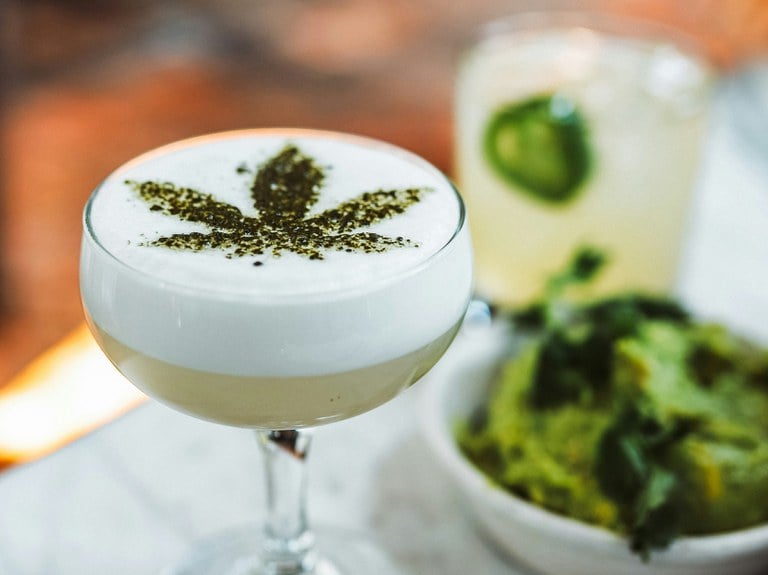Driving High vs. Driving Drunk
Hint: both are dangerous. Both are illegal.
While driving high isn't identical to driving drunk, there are undeniable similarities between the two. Both alcohol and marijuana impact your ability to drive safely. Driving drunk may be more prevalent, but driving high is still dangerous and illegal — and the effects of each substance present major risks on Colorado's roads. In 2023 alone, there were 227 impaired driving deaths in Colorado, representing nearly 32% of all road fatalities in the state.
When intoxicated, whether by alcohol, cannabis, or both, reflexes slow, coordination declines and decision-making is compromised. While both substances negatively impact driving, their effects have similarities and differences:
Driving drunk
- Impairment from alcohol often leads to overconfidence, impaired judgment and increased risk-taking behavior — evidenced by speeding, weaving through traffic and ignoring traffic signals.
- Alcohol impairment can slow your reaction time and impairs vision, which greatly increases the risk of a crash.
- Alcohol impairs the ability to concentrate, decreasing a driver’s ability to focus on speed, other traffic, lane position and in responding to dangers posed by other drivers and pedestrians.
Driving high
- Driving high decreases your ability to perform divided attention tasks, such as reading a traffic sign while not swerving, or paying attention to traffic and looking out for pedestrians. It also can alter your perception of time and distance, making it dangerous to pull out onto a busy road. Other effects of cannabis impairment include.
- Cannabis impairment can cause anxiety or paranoia, causing drivers to become overly cautious, drive slowly (which can be dangerous) and overreact to stimuli.
- Combining alcohol and cannabis significantly amplifies the impairing effects of both substances. This can affect judgment, coordination and reaction time, and drastically increases the risk of a crash. Research also shows that users are more likely to drive — or take other risks — after using both substances than after consuming marijuana alone.
The Colorado Division of Criminal Justice (DCJ) published a report in July 2023 that analyzed 2020 data from more than 21,000 impaired driving cases filed in Colorado. Researchers followed the cases from arrest to final court outcome. The DCJ report found:
- 18% of impaired drivers arrested tested positive for multiple substances. The most common combination was alcohol and Delta 9-THC, which is the primary psychoactive component of cannabis.
- The second most common pairing was alcohol combined with other drugs such as cocaine, methamphetamine, sedatives and opioids.
- 75% of individuals with detected Delta-9 THC also had some other substance present. Alcohol was the most common co-occurring substance.
There’s a lack of clarity surrounding cannabis intoxication and measuring impairment, creating confusion and concern both in the highway safety community and for the public. Unlike the neatly defined units of beer, wine or spirits, cannabis exists in a variety of forms and potencies. Edibles, vapes, flower — each delivery method and strain impacts individuals differently.
Adding to the challenge, the subjective experience of cannabis intoxication varies wildly. Tolerance plays a role as well. While one person might feel a little buzzed, another could be significantly impaired, even with similar consumption levels. This makes it tricky for consumers to measure how much they’ve actually consumed, and to assess how much cannabis is too much before getting behind the wheel.

No matter how much you consume, Colorado law empowers law enforcement officers to assess impairment through roadside evaluation, and if you are deemed impaired — no matter what BAC or THC blood tests reveal — you can be charged with a DUI.
Because there is no roadside device in Colorado to detect THC, law enforcement officers, including those trained as drug recognition experts (DREs), base arrests on observed impairment. Under Colorado law, officers can arrest someone who uses marijuana for medicinal purposes for driving under the influence if an officer observes impairment.
Whether you’re drinking alcohol or using cannabis, it's never OK to drive if you’re impaired. Opt for alternative transportation, designate a driver, or wait until you're sober before hitting the road. Your responsibility extends beyond yourself.
For more tips on staying safe, check out our Cannabis and Driving Education Resources page.
